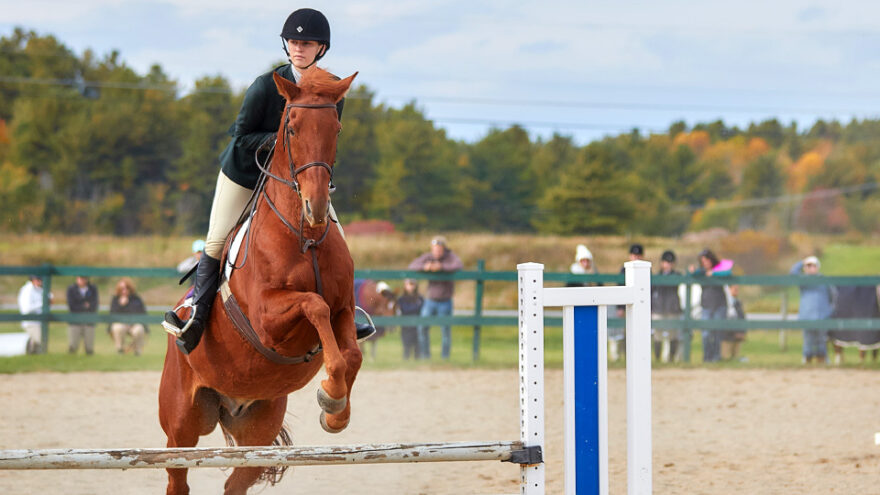You don’t need to know how to ride a horse to be part of Middlebury’s Equestrian Club. Beginners are welcome and, as a matter of fact, are necessary for the club to compete in collegiate equestrian shows. Teams must have all levels of talent, from novice to experienced riders.
You also don’t need your own horse. The team members practice at the Eddy Farm School—a horse farm a few miles from campus—with their coaches, Kate Selby, who founded the club, and Margaret Bojanowski, who manages the farm and is the riding director.
The club had its beginnings in 1994 when Selby, a competitive rider herself, bought a farm in New Haven, Vermont, that came full of horses that boarded there. Some of their owners worked at the College, and when they came to ride, they would sometimes bring students. One day one of those students asked Selby if she would coach a college equestrian team. Selby was interested but not sure how to proceed. She contacted the Intercollegiate Horse Shows Association (IHSA), the governing body for college competition, and asked what she should do. “Basically, they said fill out the paperwork and pay them money,” says Selby.
The club has been active ever since, competing against other club sport and varsity teams in New England in the form of riding called hunt seat equitation, which is judged on the rider and the rider’s effectiveness in communicating with the horse. There’s a level of competition for everyone. Beginners might compete in the introductory walk/trot; someone a bit more skilled might compete in the advanced walk/trot/canter; while the experienced riders will be jumping fences in their divisions. The shows take place in the fall and spring with riders gathering points to possibly move on to regional, zone, and national competitions.
But here’s why you don’t need your own horse. One of the IHSA’s rules is that everyone participating in a show rides a horse they’ve never ridden before. The students arrive at the venue and can watch the horses warming up, but they basically pull a name out of a hat to find out which one they’ll be on. Then they’re judged on their performance on an unfamiliar horse. “It makes the drawing board fair,” says Bojanowski.
The show season begins in early October and ends at Thanksgiving with a couple more shows in March before regionals in April and zones and nationals following. Different clubs host shows, and Middlebury typically cohosts each year with UVM. Hosting a big show is expensive, particularly because the schools don’t have enough horses for all the riders and need to lease them from various barns. Like other club sports and student activities, the equestrian team is funded through money budgeted by the Student Government Association.
There are serious rules in place regarding safety. All coaches have to pass a coach’s exam and have to do concussion safety training and SafeSport training. There are rules about clothing, from how to fasten a hard hat properly to what type of boots can be worn. Stewards at an event can investigate tack and can even hold up a show if they find, say, that a stirrup leather is about to fall apart and a new one is needed. EMTs are present at every show.
“We also just enacted our own regional rule saying you can wear a safety vest when you compete,” says Selby. “There are two kinds: ones that are like a very thick closed-cell foam that are very sturdy and protect the rib cage and shoulders; and the newest ones, which are air vests that attach with a coil to the saddle so if you become separated from your horse more than the distance of the coil, it pops a cartridge in your vest and blows up to surround your kidneys, hips, neck, chest.”
Getting ready to compete includes attending one required practice a week at the Eddy Farm. The coaches are well versed in teaching different experience levels. A beginning rider may start out learning how to groom and learning about the different parts of tack before getting on a horse. “When you have a complete beginner, there’s a lot to learn,” says Bojanowski. “We’re lucky because a couple of the school horses are babysitters—they’ve taught so many lessons. We can talk to the horse.” Brenae’ Ervin ’26 was one of those newbies. “My first lesson was one of the best experiences I have had! My coach went through the basics, and I started out walking/trotting in my first semester before I started competing.”
More experienced riders take advantage of the coaches’ expertise to build on their skills. Fiona Stern ’28 has been riding since she was young. “My first few lessons at Middlebury were amazing. I was taken with Coach Kate’s knowledgeable teaching, the sweet-tempered horses, and the breathtaking views from Eddy Farm. Through my lessons on the team, I have bettered my horsemanship skills, my equitation, and my confidence.”
But even more importantly, the club members build a close relationship around a shared love. “Belonging to the club means that I have this great community that understands the sport of horseback riding, and everyone supports each other,” says Ervin. “It makes being on the team such an amazing experience!”

Leave a Reply